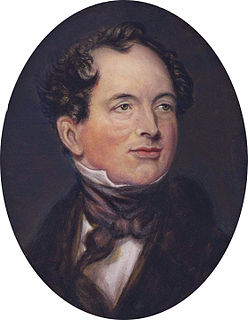A Quote by Samuel Johnson
Surely nothing is more reproachful to a being endowed with reason, than to resign its powers to the influence of the air, and live in dependence on the weather and the wind, for the only blessings which nature has put into our power, tranquillity and benevolence. To look up to the sky for the nutriment of our bodies, is the condition of nature; to call upon the sun for peace and gaiety, or deprecate the clouds lest sorrow should overwhelm us, is the cowardice of idleness, and the idolatry of folly.
Quote Topics
Air
Being
Benevolence
Blessings
Bodies
Call
Clouds
Condition
Cowardice
Dependence
Endowed
Folly
Gaiety
Idleness
Idolatry
Influence
Lest
Live
Look
Look Up
More
Nature
Nothing
Only
Our
Overwhelm
Peace
Power
Powers
Put
Reason
Resign
Should
Sky
Sorrow
Sun
Surely
Than
Tranquillity
Up
Us
Weather
Which
Wind
Related Quotes
The indescribable innocence and beneficence of Nature-of sun and wind and rain, of summer and winter-such health, such cheer, they afford forever! and such sympathy have they ever with our race, that all Nature would be affected, and the sun's brightness fade, and the winds would sigh humanely, and the clouds rain tears, and the woods shed their leaves and put on mourning in midsummer, if any man should ever for a just cause grieve.
It is the nature of the noble and the good and the wise that they impart to us of their nobility and their goodness and their wisdom while they live, making it natural for us to breathe the air they breathe and giving us confidence in our own untested powers. And the same influence in more ethereal fashion they continue to exert after they are gone.
Many people think that when we practice agriculture, nature is helping us in our efforts to grow food. This is an exclusively human-centered viewpoint... we should instead, realize that we are receiving that which nature decides to give us. A farmer does not grow something in the sense that he or she creates it. That human is only a small part of the whole process by which nature expresses its being. The farmer has very little influence over that process... other than being there and doing his or her small part.
Let us, then, take our compass; we are something, and we are not everything. The nature of our existence hides from us the knowledge of first beginnings which are born of the nothing; and the littleness of our being conceals from us the sight of the infinite. Our intellect holds the same position in the world of thought as our body occupies in the expanse of nature.
Let me define a garden as the meeting of raw nature and the human imagination in which both seek the fulfillment of their beauty. Every sign indicates that nature wants us and wishes for collaboration with us, just as we long for nature to be fulfilled in us. If our original state was to live in a garden, as Adam and Eve did, then a garden signals our absolute origins as well as our condition of eternity, while life outside the garden is time and temporality.
We must look deeply into the nature of our volition to see whether it is pushing us in the direction of liberation from suffering and toward peace and compassion, or in the direction of affliction and misery. What is it that we really want deep in our heart? Is it money, fame, power? Or is it finding inner peace, being able to live life fully and enjoy the present moment?
Nature consists of facts and of regularities, and is in itself neither moral nor immoral. It is we who impose our standards upon nature, and who in this way introduce morals into the natural world, in spite the fact that we are part of this world. We are products of nature, but nature has made us together with our power of altering the world, of foreseeing and of planning for the future, and of making far-reaching decisions for which we are morally responsible. Yet, responsibility, decisions, enter the world of nature only with us
We are like tenant farmers chopping down the fence around our house for fuel when we should be using Nature's inexhaustible sources of energy - sun, wind and tide. ... I'd put my money on the sun and solar energy. What a source of power! I hope we don't have to wait until oil and coal run out before we tackle that.
Doubt is not a pleasant condition, but certainty is an absurd one. What is most repellent in the System of Nature - after the recipe for making eels from flour - is the audacity with which it decides that there is no God, without even having tried the impossibility. If God did not exist, he would have to be invented." But all nature cries aloud that he does exist: that there is a supreme intelligence, an immense power, an admirable order, and everything teaches us our own dependence on it.






































